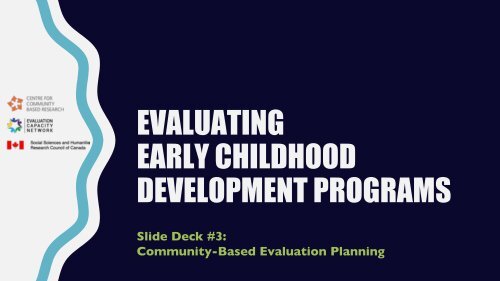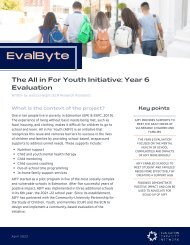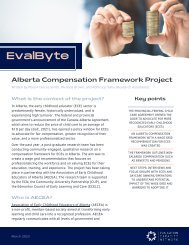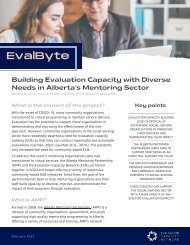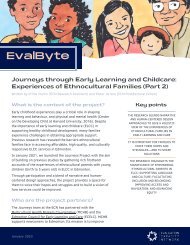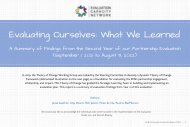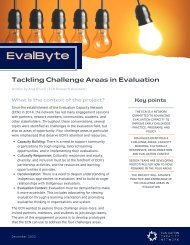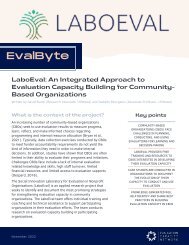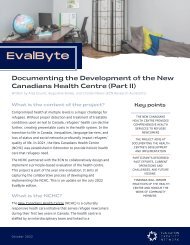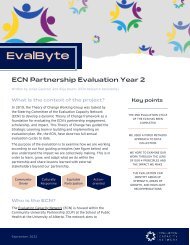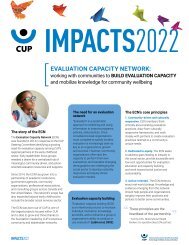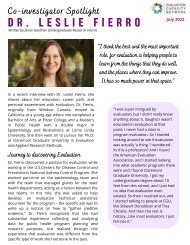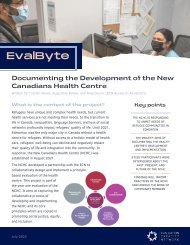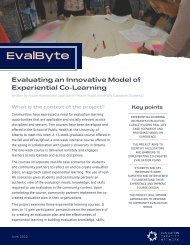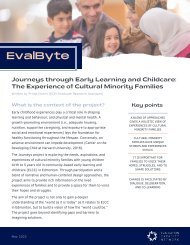Community-Based Evaluation Planning
You also want an ePaper? Increase the reach of your titles
YUMPU automatically turns print PDFs into web optimized ePapers that Google loves.
EVALUATING<br />
EARLY CHILDHOOD<br />
DEVELOPMENT PROGRAMS<br />
Slide Deck #3:<br />
<strong>Community</strong>-<strong>Based</strong> <strong>Evaluation</strong> <strong>Planning</strong>
How To Use These Slide Decks<br />
Review the slides and practice on the evaluation workbook.<br />
look for # to<br />
find the<br />
corresponding<br />
exercise page on the<br />
workbook!<br />
Visit www.evaluationcapacitynetwork.com to access<br />
• The complimentary evaluation workbook<br />
• Complimentary live webinars’ recordings
#1 Laying the<br />
Foundation<br />
#4 Acting on<br />
Findings<br />
Welcome Back!<br />
#2 <strong>Evaluation</strong><br />
<strong>Planning</strong><br />
#3 Information<br />
Gathering/Analysis<br />
Slide deck #1: Introduction to community-based evaluation<br />
Slide deck #2: Laying the foundation in community-based evaluation<br />
Slide deck #3: <strong>Community</strong>-based evaluation planning<br />
Slide deck #4: Information gathering and analysis<br />
Slide deck #5: Acting on findings<br />
You are<br />
here!
The Four Phases Of <strong>Community</strong>-based<br />
<strong>Evaluation</strong><br />
Relational:<br />
• Negotiating mobilization of<br />
knowledge and people<br />
Technical:<br />
• Sharing learnings<br />
• Initiating new action<br />
#1 Laying the<br />
Foundation<br />
Relational:<br />
• Negotiating goals and roles<br />
Technical:<br />
• Identifying stakeholders and organizing<br />
steering committee<br />
• Identifying assumptions about evaluation<br />
• Highlighting the theory of change<br />
• Identifying the purpose of the evaluation<br />
#4 Acting on<br />
Findings<br />
USE<br />
evaluation<br />
#2 <strong>Evaluation</strong><br />
<strong>Planning</strong><br />
DO<br />
evaluation<br />
Relational:<br />
• Negotiating meaning<br />
and learning<br />
Technical:<br />
• Gathering information ethically<br />
• Analyzing and summarizing<br />
#3 Information<br />
Gathering/Analysis<br />
Relational:<br />
• Negotiating perspectives to include<br />
Technical:<br />
• Determining the evaluation questions<br />
• Developing methods for collecting<br />
information<br />
• Developing an analysis plan
What This Slide Deck Covers<br />
Phase #2 <strong>Evaluation</strong> <strong>Planning</strong><br />
1. Determine the evaluation questions<br />
2. Develop methods for collecting information<br />
#2 <strong>Evaluation</strong><br />
<strong>Planning</strong><br />
3. Develop an analysis plan
1<br />
Determine The <strong>Evaluation</strong> Questions
Main <strong>Evaluation</strong> Questions<br />
• The big questions that should be answered at the<br />
end of the evaluation (not the specific questions<br />
you ask evaluation participants)<br />
• Your questions are linked to the purpose<br />
statement<br />
• By answering these questions, you start to fulfill<br />
the purpose<br />
• With community-based evaluation, you will<br />
ensure the voices and interests of the steering<br />
committee and other stakeholder groups are<br />
used to create these questions
Main <strong>Evaluation</strong> Questions<br />
The evaluation question might be related to project<br />
or program process, outcomes, and/or future<br />
directions.<br />
PROCESS About the implementation, or process of delivering early childhood<br />
QUESIONS<br />
development programs. Should incorporate key process components of<br />
your logic model (i.e., inputs, activities, and outputs)<br />
OUTCOME<br />
QUESTIONS<br />
FUTURE<br />
DIRECTIONS<br />
QUESTIONS<br />
About the effects of early childhood development program delivery and<br />
for its participants. Should incorporate key outcome components of<br />
your logic model (i.e., short-, intermediate-, and long-term outcomes)<br />
About how the learnings from the evaluation can be applied to<br />
strengthen or scale up the program, contribute to increased wellness of<br />
children, etc.
Main <strong>Evaluation</strong><br />
Questions<br />
Illustration<br />
City Kidz<br />
Program<br />
How well are core<br />
City Kidz programs<br />
being implemented?<br />
PROCESS<br />
How and to what extent<br />
have core City Kidz<br />
programs impacted the<br />
well-being of children in<br />
low-income communities<br />
of Hamilton?<br />
What suggestions<br />
would help to<br />
improve and<br />
replicate core City<br />
Kidz programs?<br />
DEVELOPMENTAL<br />
OUTCOME
Final Tips For <strong>Evaluation</strong> Questions<br />
• Choose questions that are “open ended” and not just “yes” or “no”<br />
questions<br />
• Include questions related to process and questions related to outcomes<br />
• All these questions should tie back to the purpose statement<br />
If you want to identify and understand gaps in a program,<br />
you could have main evaluation questions like these:<br />
• What gaps exist? What is the consequence of the gap?<br />
• How do these gaps negatively affect the client and outcomes?
Exercise 1<br />
7<br />
What do you intend to understand with this<br />
evaluation?<br />
• What are the 3-4 main questions that you want the evaluation of your project<br />
to answer?<br />
• How would answering these questions fulfill your evaluation’s purpose?<br />
Prioritize potential questions and apply this to your<br />
project evaluation, for each question ask:<br />
• How would answering this questions fulfill your evaluation’s purpose?<br />
• Does this question reflect the priorities of stakeholders?<br />
• Would this question provide information which can be acted upon to make<br />
improvements?
2<br />
Develop Methods For Collecting<br />
Information
Methods For Collecting Information<br />
Start with … existing data<br />
• What information do you already have, or collect?<br />
• How does this data help answer your main evaluation questions?<br />
• If your organization already has a data collection method in place, use that<br />
data!<br />
Not enough data collection methods in place?<br />
Then add … new data<br />
• Are there gaps in the information needed to answer your main questions?<br />
• What new data is needed to fill these gaps and better understand your<br />
main questions?
New Data: Methods Menu<br />
Data can be<br />
PRIMARY<br />
(new) and<br />
SECONDAR<br />
Y (preexisting)<br />
Qualitative<br />
• Individual interviews<br />
• Focus groups<br />
• <strong>Community</strong> forums<br />
• Participant observation<br />
• Literature review<br />
• Other?<br />
Quantitative<br />
• Surveys<br />
• Informal questionnaires<br />
• Census data<br />
• Large data sets (ex. iCare)<br />
• Intake forms<br />
• Other?<br />
Consider<br />
who is going<br />
to be<br />
collecting<br />
and<br />
analyzing<br />
the data<br />
It’s best to<br />
use multiple<br />
methods<br />
from<br />
multiple<br />
perspectives
Quantitative vs. Qualitative Methods<br />
Quantitative data …<br />
• Data is in the form of numbers<br />
• Is concerned with measurement<br />
• Provides breadth of<br />
understanding<br />
Qualitative data …<br />
• Data is in the form of words and<br />
stories<br />
• Is concerned with meaning<br />
• Probes for the lived experience of<br />
individuals<br />
ü Quantitative and qualitative methods each have different purposes and qualities<br />
ü Both methods are rich sources of information, but in different ways<br />
ü Use multiple methods of data collection from multiple perspectives to get a well -<br />
rounded understanding of your program<br />
ü Your evaluation questions will determine the type of methods you use!
The Instrument: What Produces Quality Data?<br />
The quality of data depends on different things with different methods<br />
Interviews/Focus Groups/Other Interactive Conversations<br />
• the interviewer is the “instrument”; it is important that they are skilled and can ask questions in a way that<br />
people freely talk<br />
• the way the interview is conducted is the most important<br />
Photovoice/Video/Other Interactive Digital Tools<br />
• participant training is the “instrument”; it’s important that research participants are trained well in using<br />
digital tools when gathering data<br />
• the way the data is collected is the most important<br />
Surveys/Tracking Tools/Other Quantitative Methods<br />
• the tool itself (potentially standardized) is the “instrument”<br />
• the way the tool is designed is the most important<br />
Literature Review/Other Secondary Data<br />
• the theoretical framework is the “instrument”<br />
• the way the data is searched and reviewed is the most important
Illustration<br />
City Kidz<br />
Program<br />
Program Tracking<br />
Tool<br />
• Recording program inputs<br />
and outputs for the<br />
program year<br />
Key Informant<br />
Interviews<br />
• Four interviews with<br />
community partners<br />
Client Survey<br />
• One custom-made survey<br />
with children<br />
• Random sampling<br />
• 124 respondents<br />
Participant Focus<br />
Groups<br />
• Three focus groups with<br />
program participants and<br />
their parents<br />
• 8-10 participants/group<br />
Staff/Volunteer<br />
Interviews<br />
• One focus group with<br />
staff/volunteers<br />
• Interviews with two<br />
members of the senior<br />
leadership team<br />
Case Studies<br />
• Three case studies<br />
• Each case study included<br />
interviews with one<br />
participant, one staff, one<br />
family member or friend
Exercise 2<br />
8<br />
What methods will you use to answer your main<br />
evaluation questions?<br />
• What are the best ways to answer your evaluation questions (and<br />
capture different stakeholder perspectives)?<br />
• How do your methods work together to answer the main evaluation<br />
questions better than if they were conducted alone?<br />
• In what order (or stages) should the methods be carried out?<br />
• For those methods requiring you to recruit participants:<br />
o<br />
o<br />
How will you select people to be involved (i.e., sampling)?<br />
How will you go about recruiting people (i.e., recruitment strategy)?
3<br />
Determine An Analysis Plan
Analysis Plan<br />
• Think ahead about how you will handle<br />
the data you will collect<br />
• An analysis plan helps you …<br />
o<br />
o<br />
o<br />
discover the holes or gaps in your plan<br />
keep on budget and timeline<br />
Realize if you are collecting more data than<br />
what you can handle<br />
• Go back to the data collected and ask “is<br />
this data actually answering my<br />
evaluation questions?”
Analysis Plan<br />
Summarize the data that is being<br />
gathered<br />
• Come up with a plan to summarize all your data across methods in a<br />
way that answers your main evaluation questions and guided by the<br />
logic model.<br />
Tips for the analysis plan<br />
• Trust the original design and questions<br />
• Decide who will be involved in the data analysis<br />
• Build in flexibility - leave time for reflection<br />
• Assess the soundness of the analysis plan with the steering committee<br />
You will learn more about data analysis in slide deck #4.
Exercise 3<br />
9<br />
How will you go about analyzing your data?<br />
• What strategies will you use to analyze qualitative data?<br />
o<br />
o<br />
o<br />
How will you prepare the data for analysis (ie. transcribing, summarizing, etc.)<br />
Who will be involved in data analysis? Do you have the expertise on your team or<br />
do you need external mentorship?<br />
What is the timeline for data analysis?<br />
• What strategies will you use to analyze quantitative data?<br />
o<br />
o<br />
o<br />
How will you prepare the data for analysis (ie. exporting to data analysis software,<br />
data cleaning, etc.)<br />
Who will be involved in data analysis? Do you have the expertise on your team or<br />
do you need external mentorship?<br />
What is the timeline for data analysis?<br />
• How will you do analysis across methods?
Recap<br />
Phase #2 - <strong>Evaluation</strong> <strong>Planning</strong><br />
• Determine the evaluation questions<br />
• Develop methods for collecting information<br />
• Develop an analysis plan<br />
#2 <strong>Evaluation</strong><br />
<strong>Planning</strong>
What Is Next …<br />
In slide deck #4, you will learn about information gathering<br />
and analysis that includes:<br />
• Gathering information ethically<br />
• Analyzing and summarizing information
Need Additional Support?<br />
Ø Coaching and mentoring<br />
Ø Partnering on an evaluation<br />
Ø Proposal development<br />
Ø <strong>Evaluation</strong> support, training and<br />
webinars using the <strong>Community</strong> <strong>Based</strong><br />
Research Excellence Tool (CBRET)<br />
Ø Customized training in communitybased<br />
research and evaluation<br />
Ø For even more support, visit:<br />
www.communitybasedresearch.ca
And More Support…<br />
Ø Coaching and mentoring<br />
Ø Enroll in UEval, a one-week<br />
evaluation institute<br />
Ø Participate in the Eval Lab<br />
Ø Access online resources<br />
(lectures, modules, tip<br />
sheets)<br />
Ø Join the ECN Network!


